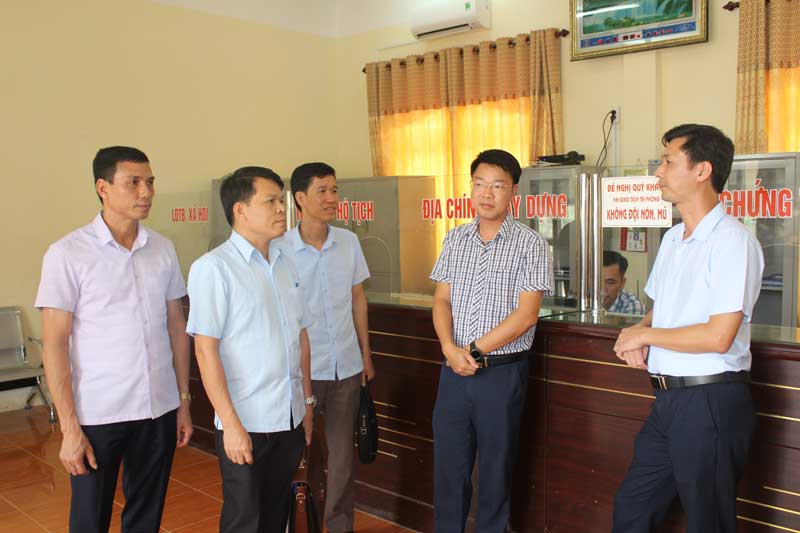
(HBO) - Chi Ne township has publicised administrative procedures, and increased the professionalism of its one-stop service staff.
 Leader of People’s Committee of Chi Ne township speaks on
administrative procedure reform at department receiving documents and paying
back results.
Leader of People’s Committee of Chi Ne township speaks on
administrative procedure reform at department receiving documents and paying
back results.
Since the beginning of this year, the People’s Committee of
Chi Ne township handled nearly 700 administrative procedure documents of all
kinds, with none solved in excess of the time limit.
All procedures are updated online and posted up at the
committee headquarters, thus better serving locals. The township often reviews
groups of administrative procedures so as to remove overlapping and unnecessary
procedures. The time for solving administrative procedures on judicial affairs
and civil status has been shortened.
Chi Ne always pays attention to training and improving the
quality of officials and public servants of the department receiving documents
and paying back results by strictly assessing their capacity, ethic and
behaviour annually.
The local People’s Committee also applies a quality
management system following ISO 9001:2008 and ISO 9001:2015 standards, which is
an effective tool to standardise the process of handling administrative
procedures. In fact, the application of the system has helped improve work
habits of public servants and reduce the time and costs of handling dossiers.
Especially, after Lac Long commune was merged into Chi Ne,
the township Party Committee and authorities quickly stabilised its apparatus
and handled related procedures for locals. In addition, the locality has launched
a movement encouraging youths to learn about a set of procedures and promptly
helped locals if they do not understand. The movement has helped youths,
especially public servants, grasp normal administrative procedures, and uphold
their responsibility./.
The Standing Board of the Hoa Binh provincial Party Committee has agreed in principle on a proposal by the Standing Board of the Party Committee of Hoa Binh city to gather feedback on the city’s 1:2000 zoning plan, which forms part of its broader urban development strategy.
Hoa Binh province has made notable progress in public administration reform and digital government development, with the satisfaction index among citizens and businesses reaching over 84%, according to recent government evaluations.
Thanks to great efforts by local authorities in recent times, the governance and public administration performance of Mai Chau district has been significantly improved.
In the afternoon of June 6, the Party Committee, the People's Council, the People's Committee and the Fatherland Front of Lac Son district solemnly held a meeting to celebrate the 139th anniversary of the district's founding (1886–2025) and the 79th anniversary of the establishment of the district's Party Committee (1946–2025). There was the attendance of Mr. Bui Van Thang, the Vice Chairman of the Provincial People's Council; Mr. Quach Tat Liem, the Vice Chairman of the Provincial People's Committee; Ms. Dang Bich Ngoc, the Deputy Head of the National Assembly Delegation of the province; as well as the former leaders of the province and district through various periods, who are the natives of the district.
Implementing the Politburo’s Resolution No. 57-NQ/TW on breakthroughs in science – technology, innovation, and digital transformation is a golden opportunity for the northern mountainous province of Hoa Binh to renew growth model, improve competitive edge and shorten digital gap.
Resolution 57-NQ/TW, issued by the Politburo on December 22, 2024, identifies sci-tech, innovation, and digital transformation as strategic breakthroughs to build a developed and prosperous nation. In Hoa Binh province, this spirit is not just a slogan, it’s being put into action through concrete initiatives that form a "new development triangle”: digital citizenship, digital economy, and digital administration.



 Leader of People’s Committee of Chi Ne township speaks on
administrative procedure reform at department receiving documents and paying
back results.
Leader of People’s Committee of Chi Ne township speaks on
administrative procedure reform at department receiving documents and paying
back results.